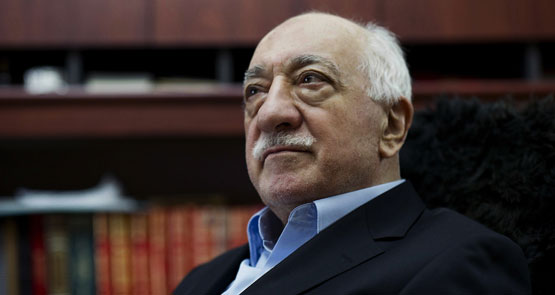
A charismatic Turkish teacher on trial in Istanbul for treason, subversion and terrorism is celebrated by Melbourne’s good and great as a man of infinite wisdom, compassion and generosity.
Fethullah Gulen is being tried in absentia along with 68 other defendants, all accused of conspiring to overthrow the government, spying and creating a terrorist organisation.
Last month a district court in the US state of Pennsylvania refused a Turkish government extradition request against Gulen, 74, who lives in a luxury security compound in Saylorsburg, Pennsylvania.
The 1453-page indictment presented to the Istanbul court last Wednesday accused the “Gulenistas” of “attempting to topple the government of the Turkish Republic or trying to prevent it from fulfilling its duties by use of force and violence” and organising a terrorist group called the Fethullahci Terror Organisation (FeTO)/Parallel State Structure (PDY).
Chief prosecutor Ismail Ucar is demanding Gulen be given “an aggravated life term”, or 52 years. His co-accused, mainly intelligence, army and police chiefs, face prison sentences of between seven and 330 years. The show trial has been adjourned until February 9.
But in Australia, Gulen isn’t regarded as a terrorist or coup plotter. On the contrary, two high-profile educational and cultural institutions are enthusiastic Gulen supporters — the Australian Intercultural Society and Australian Catholic University in Melbourne.
The AIS, founded in Melbourne in 2001, boasts that “we are inspired by Fethullah Gulen, a Turkish Islamic scholar who emphasises dialogue, respect and tolerance”.
The society works alongside the Victorian Multicultural Commission, the Australian Federal Police, the Department of Foreign Affairs and Trade, the Catholic Archdiocese of Melbourne, Rotary and the Buddhist Council of Victoria to spread Gulen’s inter-faith teachings.
The society’s current chair is Professor Rae Francis of Monash University and deputy chair is Federal Court judge Justice Shane Marshall.
ACU was so overwhelmed by Gulen’s inter-faith dialogue that in 2007 it established a Fethullah Gulen Chair in the Study of Islam and Muslim-Catholic Relations at its St Patrick’s campus in Fitzroy.
The event was attended by former governor-general Dr Peter Hollingworth, former governor of Victoria Sir James Gobbo, Victorian minister for multiculturalism James Merlino, Melbourne lord mayor John So, Victoria Police commissioner Christine Nixon, senior members of the Victorian police, the Australian Federal Police, and the consul-generals of United States, UK, Germany, Indonesia and Turkey.
Ankara-born Dr Ismail Albayrak, a graduate from the Ankara University’s school of divinity, was appointed the inaugural chairman.
The university’s website praises Gulen as “a Turkish-born scholar, educator, spiritual and social leader and a renowned advocate for inter-religious dialogue and peace”.
“Gulen is especially noted in Catholic circles for his private audience with Pope John Paul II at the Vatican in 1998,” it states. “This marked an important step forward in Moslem-Catholic relations.”
Gulen and President Recep Tayyip Erdogan were once the closest political allies in the Justice and Development Party (AKP), which came to power in 2002.
However, there was a bitter falling out when a corruption investigation revealing massive financial scandals involving Erdogan and his son, Bilal, was made public in December 2013. Today they are sworn enemies.
The atmosphere surrounding the trial has been tumultuous, with the mass arrest of 1800 Gulen supporters, state harassment of the media and police violence against anti-government demonstrators.
The country’s lucrative tourist industry has virtually collapsed as protesters and police clash across the country and US and Russian war planes bomb neighbouring Syria, exacerbating inter-communal tensions.
In last November’s elections, Erdogan’s party secured a sweeping victory, allowing him to continue one-party rule. Since then, the 61-year-old former Istanbul mayor has stepped up his campaign to dismantle the secular achievements of the republic’s founder, Kemal Ataturk, 1881-1938, and introduce a stricter version of Islam.
The cleric-in-exile has launched over 1000 charter schools across the world — there are seven in Australia — which follow his teachings and offer a fee-paying alternative to state schools. With funds pouring into his worldwide movement called Hizmet (Turkish for “service”), Gulen is reported to be a billionaire with aspirations to be the country’s next leader.
His current trial has gone unreported and unnoticed by Australia’s mainstream media, and his local cheer squad appears to be taking cover.
But many observers are predicting violent street clashes this year between pro-government Erdogan forces and “parallel government” supporters of Gulen.
If Turkey becomes a battleground between the two sides, high-profile backers of Gulen in Australia will not be able to remain neutral.








“Overthrow the government”? Like an election …?
For a less adulatory and more objective view of just who Gulen is and what he and his organisation are up to, I recommend reading William Engdahl’s interview with Deniz Ulkutekin of Turkey’s Cumhuriyet newspaper. It can be found on Boiling Frogs Post 10
February 2015.
Nah, they tried that and Erdogan did so rilly, really badly that they had to have another to get it Right.
Falun Gon, angels pinheads etc, can we just the the obscurantists in their self imposed darkness?
‘But many observers are predicting violent street clashes this year between pro-government Erdogan forces and “parallel government” supporters of Gulen.’ Who are those observers? what do you mean by pro-government Erdogan forces? can you show an example of supporters of either side ever clashed violently? I get the point of your article but perhaps need to be toned down a bit.